
A Culm grassland meadow at Volehouse Moor nature reserve. Photo, David Chamberlain
Working Wetlands delivering Upstream Thinking
What's good for water is good for wildlife
Restoring our species-rich wet grasslands will, in turn, improve the water quality in our rivers.
The Upstream Thinking (UST) initiative has successfully completed its first three phases since launching in 2008. We’re excited to continue our partnership with South West Water as we move into the fourth phase of the programme, running from 2025 to 2030.
Discover the progress the project has achieved between 2020-2025
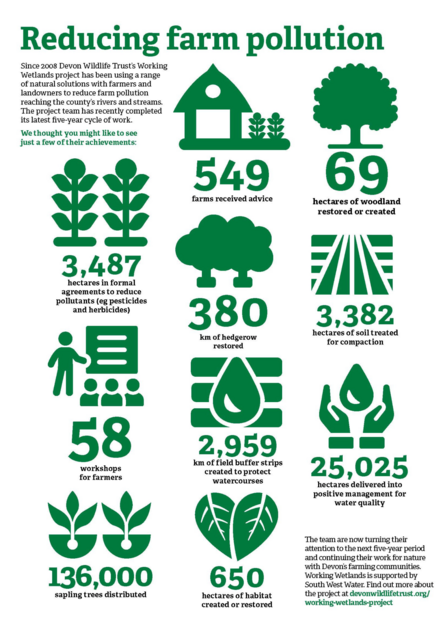
What we do
Since 2008 Working Wetlands advisers have been working with farmers and landowners to address potential sources of pollution on farms, with the aim of using natural solutions to protect water quality and quantity, and restore wildlife habitats. Our aim is to ensure that both farmers and the natural environment benefit from the advice we provide.
We use natural habitats to buffer watercourses, slow the flow of water, and trap sediments before they reach rivers and streams.
Restored species-rich wet grasslands, often marginal to a working farm, act as natural filters to capture soil particles and nutrients from fertilisers before they reach rivers and reservoirs, and act as highly effective buffers between agricultural practice and the water course.
An additional benefit of this kind of restoration is an increase in the capacity of the habitat to store water, which relieves downstream flooding risk, as well as reducing soil erosion and diffuse pollution.
Other Natural Solutions that we can use to improve catchment management range from tree and hedge planting, to use of diverse leys to reduce the use of veterinary medicines, and advice on improving soils through changing grazing regimes.
In addition we also provide advice and for a wide range of farming practices and farm infrastructure improvements.
Between 2015 and 2020 our advisors worked with 488 landowners, enabling 285 of them to make changes beneficial to the water environment across over 22,000ha. 147 of those landowners entered into Countryside Stewardship agreements, helping to draw down an additional £7.9 million of investment.
See the results and benefits in action from a recent project in mid-Devon, watch the full video here.
Read the South West Water Upstream Thinking report here
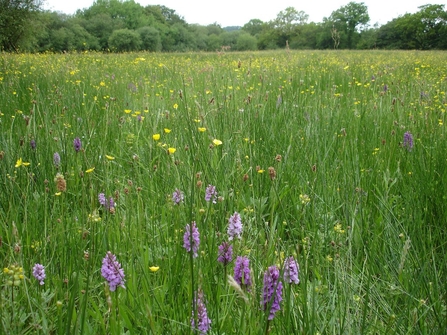
Wildlife is also benefitting. Since 2015 we have helped create and manage over 450ha of species rich grassland, providing space for rare species such as the marsh fritillary butterfly.
Upstream Thinking
Upstream Thinking is South West Water’s multi-award-winning approach to keeping our drinking and bathing water clean and affordable by stopping pollutants entering our rivers and streams. Ensuring that our waterways are clean for wildlife and for people.
South West Water in collaboration with a group of regional conservation organisations, including Devon Wildlife Trust and the Westcountry Rivers Trust among others, have established one of the largest and most innovative conservation projects in the UK for catchment management: ‘Upstream Thinking’.
For more information on Upstream Thinking, go to the South West Water website.
South West Water invest in this programme of works as the way land is managed has an impact on water quality. By working with landowners it means that we all benefit from cleaner water, better water flows throughout the year, and we can create more space for nature on farmland.
What we can offer
Our team of farm advisors cover eight strategically chosen river catchments: Barnstaple Yeo, Dart, Fernworthy Reservoir, Lower Exe, Otter, Roadford Reservoir, Tamar, and Wistlandpound Reservoir. We work upstream of the places where drinking water is taken from the rivers and reservoirs, enabling us to have the biggest impact on raw water quality.
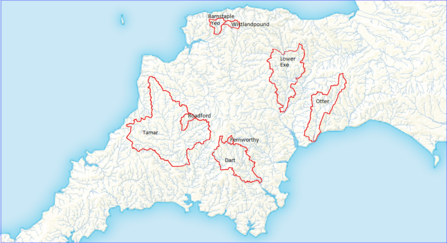
Credit: David Thomas
We have now extended our river catchment to include the Tavy. Devon Wildlife Trust farm advisors will be working with landowners and managers to tackle issues including soil compaction and erosion, nutrient and pesticide run-off, and flooding. Addressing these issues not only has benefits to water quality, but they also provide many on-farm benefits too, such as improved grass productivity and animal health, and economic savings.
Take a look at the farm advisory service that we now offer in the River Tavy catchment
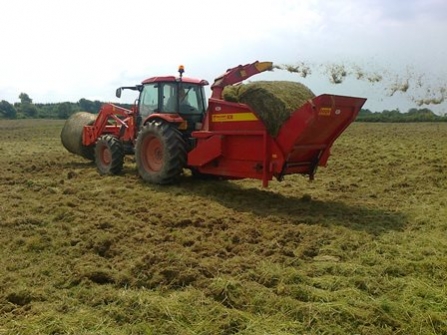
Confidential farm advice and farm plans - free visit from a farm advisor to offer advice on habitats and wildlife, management of nutrients, soil, pesticides, yard infrastructure and watercourse management. Where possible we aim to solve issues using natural solutions.
Countryside Stewardship applications - free advice and full support with applications to the Countryside Stewardship Scheme, Mid Tier and Higher Tier.
Wildlife habitat restoration and creation – we can offer expert advice and undertake associated conservation management such as the spreading of green hay, seed harvesting and spreading, and scrub control.
Capital grants for habitat management, pesticides, soil, and manure management – grants of up to 50% for infrastructure works such as bio-beds for pesticide management, watercourse fencing, improved slurry and manure storage, roofing feed yards, silt traps, habitat management and constructed wetlands.
Working Wetlands machinery ring – we can loan equipment such as soil aerators to help reduce soil compaction, a common problem on many farms. All equipment is provided to landowners free of charge.
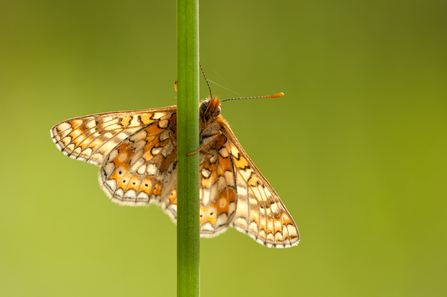
Marsh fritillary butterfly. Photo, Ross Hoddinott/2020VISION
Biodiversity monitoring – monitoring rare species such as the marsh fritillary butterfly, willow tit and greater horseshoe bat. And surveying wildlife habitats on farms.
Find out more or get involved
If you are a landowner and would like more information on the project, please email workingwetlands@devonwildlifetrust.org
Further resources
Downloadable advice notes
1. Advice note - Culm grassland
2. Advice note - Managing Culm grasslands
3. Advice note - Scrub management
4. Advice note - Managing rushes
5. Advice note - Hedge management
6. Advice note - Swaling
7. Advice note - Water and soil management
8. Advice note - Wet grassland restoration
10. Advice note - Where to find out more information
The first seven years of Working Wetlands

Become a member and support our work
The vital work we do for nature depends on the support of people who care about the future of Devon’s wildlife and wild places.
